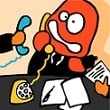 More often than not, when I ask our workshop participants why they get interrupted and why they are unable to stay focused on the task at hand, they say things like e-mail, Instant Messages (IM), phone, people stopping by, and the list goes on and on.
More often than not, when I ask our workshop participants why they get interrupted and why they are unable to stay focused on the task at hand, they say things like e-mail, Instant Messages (IM), phone, people stopping by, and the list goes on and on.
As we discuss this further, the role that their boss plays into these interruptions becomes more apparent, and many don't hesitate to air their frustration about this. Most participants report that it is their boss's e-mails, IM messages, phone calls, and surprise visits and requests that are one of the leading causes of their interruptions and inability to accomplish what they are expected to accomplish.
So I decided to write this e-mail to the bosses (following what Steve Krug did in his book Don't Make Me Think in which he wrote an e-mail to top management regarding website usability issues). Please forward this to your boss.
From: Pierre Khawand
to: <your boss>
Subject: How Managers "shoot themselves in the foot"!
Dear <your manager's name>,
As a productivity expert, I frequently discuss with my workshop participants and my readers, the role that interruptions play in diminishing our productivity and preventing us from getting our job done. One of the issues that come up often is that managers largely contribute to interrupting their staff and in a way are preventing them from delivering the same things that managers are eager to get delivered.
I decided to share my research, my thoughts, and my experiences relating to this topic with you as a manager. Having been in this role myself over the last two decades, I understand the demands that this role puts on us. On one hand we have to satisfy the needs of the people that we manage, and on the other hand, we need to satisfy the demands of top management, shareholders, and other stakeholders. This makes it difficult not to quickly react to the constantly changing environment and interrupt our staff with the hope of finding a solution to a problem or improving a certain situation.
Unfortunately these interruptions tend to disrupt progress on current tasks, reduce productivity considerably, and just as importantly impact the morale and create additional stress. Ultimately these interruptions deprive us as managers, and our workforce, from the results we desperately need. I would like to suggest three important measures that can be taken immediately to help manage the manager-induced-interruptions and minimize their impact:
- Differentiate clearly between items that are truly urgent and items that are perceived urgent. Items that are truly urgent have specific, measurable, and significant consequences on the end results if not acted upon within minutes. Items that are perceived urgent are based more on opinions, reactions, and office politics and can wait for 30 minutes to an hour or until the designated staff member is finished with their focused work. Managers who start to make this distinction, find out that most of the items that appear urgent fall in the category of "perceived urgent" and only a few pass the test of being "truly urgent."
- For items that are perceived to be urgent, shield your team from them. Instead of interrupting the team (via e-mail, IM, phone, or in person) and sacrificing the task they have at hand, make a note of these items on a special to-do list that you create for each team member. Then communicate this list at the next opportunity--the next time you have a conversation with them, the next one-on-one, or when they are not focused and able to communicate.
- Allow your team to tell you when they are focused, and be willing to defer items until they are done with their focused work. Make it "okay" to say "no" to you. In parallel, let them know how you would interrupt them when truly urgent issues come up-issues that cannot wait until they are done with their focused work.
Having such a discussion with your team will not only result in tangible business results, but will engage the team and greatly improve the team's morale.By the way, the above will also help you minimize your team's interruptions of your focused work, and also optimize your focused and collaborative/management effort.
To get the full appreciation of how significant is the negative impact of interruptions on your staff, I urge you to take a look at my findings and suggested solutions in The Results CurveTM: How to Manage Focused and Collaborative Time (free eBook or video). I also welcome your comments on this blog post, and any additional thoughts or questions that you might have.
Regards,
Pierre Khawand
Productivity Evangelist








